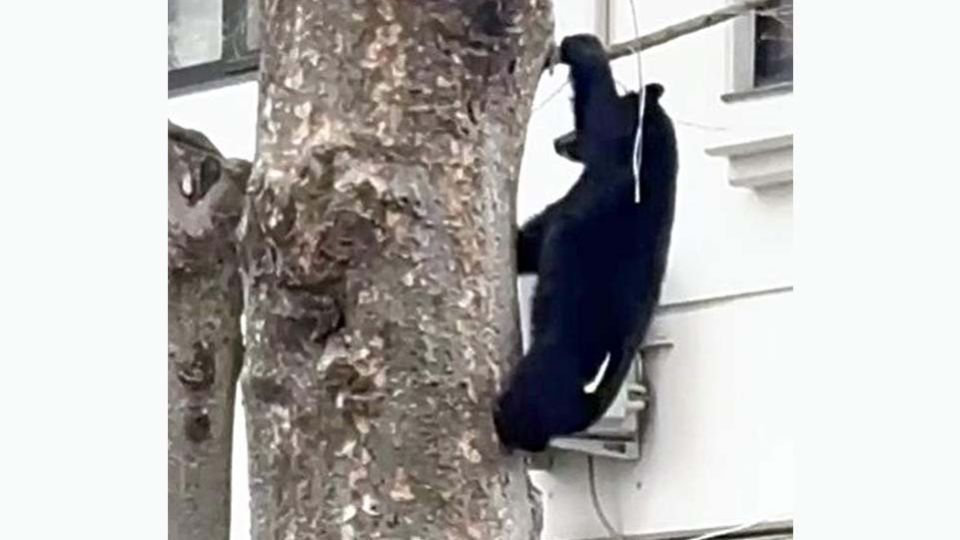September 2, 2025
MORIOKA – Municipalities can authorize guns to be used against bears in residential areas under a revised law on wildlife management that took effect on Monday.
The new law follows an increase in bear attacks that have injured and killed people and damaged property.
Under the revised Wildlife Protection, Control and Hunting Management Law, municipal governments have the discretion to allow hunters to engage in “emergency hunting with guns.”
Municipalities are rushing to launch the necessary systems to accommodate the move, but they face a myriad of challenges, including a requirement to train hunters to carry out the authorized shootings.
In April, a bear measuring about 1.5 meters long appeared in a residential area in Morioka, about 650 meters north of JR Morioka Station. The bear, which climbed a tree at a temple, was captured after it was incapacitated by a blow dart containing anesthesia.
“I never imagined a bear would appear in an area like this,” said Yoshinori Takahashi, 49, from Yahaba in Iwate Prefecture who watched the scene from his workplace. “It’s frightening to think that it crossed through the city.”
From April to July, 2,586 bear sightings were reported in the prefecture, 593 more than the same period last year. July alone had 1,024 sightings, about twice the number of the same month last year.
The prefecture has seen a record high number of annual bear sightings in fiscal 2023. It is believed to be the first time since October 2023 for more than 1,000 bear sightings to have occurred in a single month.
Heavy responsibilities
Before the law came into effect, firing a hunting gun in a residential area was prohibited in principle, except in special cases such as when ordered to do so by police officers.
In July, the Environment Ministry published guidelines on the emergency use of firearms to hunt animals in residential areas when certain conditions are met, including if a dangerous animal has entered or is highly likely to enter an area where people go about their daily lives, urgent action is required, no other means besides shooting is a viable option for dealing with the animal, and using firearms is unlikely to harm humans.
The Morioka city government revised its manuals based on the national government’s guidelines and is ready to evacuate residents, restrict traffic and implement other safety measures.
“Ensuring safety is a big responsibility for the city,” said Shinichi Tomite, head of the city’s environmental planning section. “We also want to focus on deterring bears from approaching residential areas and not just quickly resort to emergency hunting.”
With the increased burden on municipalities, the prefecture will independently establish a taskforce focused on emergency hunting. It will advise municipalities in the prefecture when they are considering using emergency hunting and on confirming the necessary procedures. It also plans to conduct a simulation drill in autumn.
Hands-on experience
Emergency hunts are expected to be carried out by hunting association members commissioned by municipalities. Hunters are required to have highly developed shooting skills and precise understanding of the practice, since there are risks of ricochets and stray bullets striking homes and other properties.
In Hanamaki in the prefecture, bears were sighted on an almost daily basis last month. Only about 10 of the around 140 members of the city hunting association possess the skills required to shoot safely in urban areas, and all 10 are veteran hunters aged 70 or older.
The association provides safety lectures and training at the shooting range to nurture younger members, but those who can actually respond to emergency bear sightings are mostly veterans who do not work at companies.
Association chairperson Hirofumi Fujinuma, 79, emphasized the importance of hands-on experience. “Making judgments about safety and other matters is difficult without years of experience handling firearms,” Fujinuma said.
Kiyoshi Yamauchi, an associate professor on wildlife management at Iwate University, said: “Because some municipalities are finding it hard to create measures to respond to the revised law, it would be best for the prefecture to establish and lead a council involving multiple local governments. Hunters also need to be provided with theoretical and hands-on training.”

